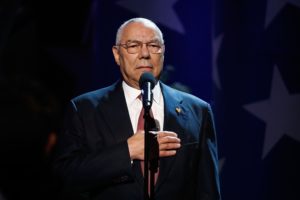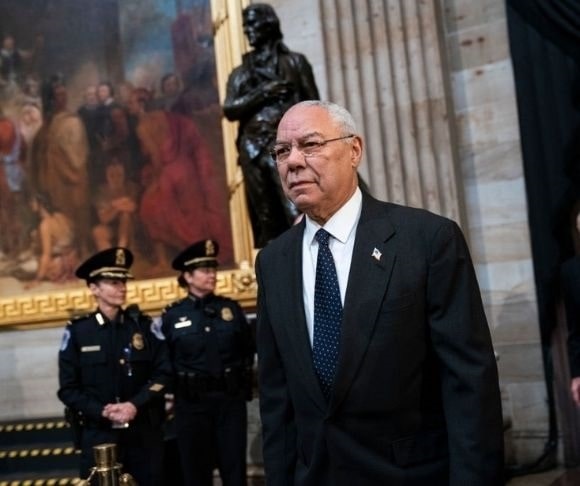On Oct. 18, General Colin Powell’s family released a brief statement that the former secretary of state and chairman of the Joint Chiefs of Staff died of complications following a COVID-19 infection. Though Powell had been fully vaccinated, he suffered from “multiple myeloma, a cancer of the plasma cells that reduces the body’s ability to fight infections.” Reuters quoted the family:
“‘We have lost a remarkable and loving husband, father, grandfather and a great American,’ his family said, thanking the staff of the Walter Reed National Military Medical Center near Washington who treated Powell, but providing few details about his illness.”

Colin Powell
(Photo by Paul Morigi/Getty Images for Capital Concerts)
Powell’s road to a high station began in Harlem, NY. Born to Jamaican immigrants and raised in the South Bronx, he entered what would be 35 years of military service through the Reserve Officer Training Corps (ROTC), where Powell graduated with the highest rank of cadet colonel. The general was seen as a “true” combat soldier. As a lieutenant, he was one of 16,000 military advisors dispatched to South Vietnam by then-President John F. Kennedy in 1962.” During a second tour in South Vietnam from 1968 to 1969, he sustained injuries in a helicopter crash; though wounded, he rescued his comrades from the burning aircraft. As a result, he was awarded the Soldier’s Medal.
Powell was perhaps one of the most thoroughly schooled military flag officers to have served in significant positions in the whole-of-government. He worked in the White House Office of Management and Budget during the Nixon administration and received an MBA from George Washington University. He returned to military duties as a battalion commander in Korea, was promoted to brigadier general, and commanded the 101st Airborne Division. Under President Jimmy Carter, Powell served as military assistant to the deputy secretary of defense and secretary of energy.
Powell’s talent for grasping complex geopolitical issues and presenting them in an understandable, decision-ready manner prompted President Ronald Reagan to appoint him as national security advisor. When George H. W. Bush took the Oval Office, he promoted Powell and appointed him Chairman of the Joint Chiefs of Staff. He was the youngest officer and the first black American to hold the position.
Among Powell’s accomplishments was his pioneering effort to establish a credible yet realistic force structure for the military. In 1989, it was clear that the Soviet Union was failing, and what had been a relatively monolithic threat for four decades was receding. Equally clear was the fact that Congress would view the demise of the Soviets as an opportunity to reduce the defense budget drastically. Some reduction was inevitable, but as the Joint History Office, Office of the Chairman of the Joint Chiefs of Staff, explained:
“General Powell also adopted the term Base Force to designate his recommended minimum force. He believed that this would better convey that his proposed force structure represented a floor below which the United States could not go and carry out its responsibilities as a superpower, rather than a ceiling from which it could further reduce forces.”

(Photo by Drew Angerer/Getty Images)
The Base Force concept did, in fact, act as a bulwark against the doves in Congress becoming vultures, going after what looked like a lame Defense Department. The defense budget withstood the long knives and was sustained at a level that would take it into the next administration.
When George W. Bush became the 43rd president, Powell was chosen as Secretary of State. His vast experience throughout the halls of government, both on the military and civilian sides, undoubtedly led to his selection.
Powell was a rare inside-the-beltway personage. He was a registered Republican who worked for three Republican presidents, two of whom awarded him the Presidential Medal of Freedom; he later supported Barack Obama and spoke out against Donald Trump. He antagonized supporters of the 45th president who viewed Powell as something of a renegade, part of the Never-Trump movement within the GOP that contributed to Trump’s demise.
According to the Border Telegraph, former British Prime Minister Tony Blair, who led the United Kingdom into the War on Terror alongside the United States, recalled:
“Colin was a towering figure in American military and political leadership over many years, someone of immense capability and integrity, a hugely likeable and warm personality, and a great companion, with a lovely and self-deprecating sense of humor. He was wonderful to work with; he inspired loyalty and respect and was one of those leaders who always treated those under them with kindness and concern.”
Former Vice President Dick Cheney said of his longtime compatriot, “General Powell had a remarkably distinguished career, and I was fortunate to work with him,” adding that he “was a man who loved his country and served her long and well.”
The views expressed are those of the author and not of any other affiliation.
~ Read more from Dave Patterson.




